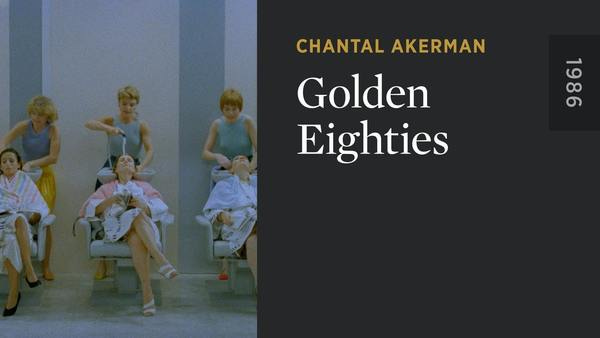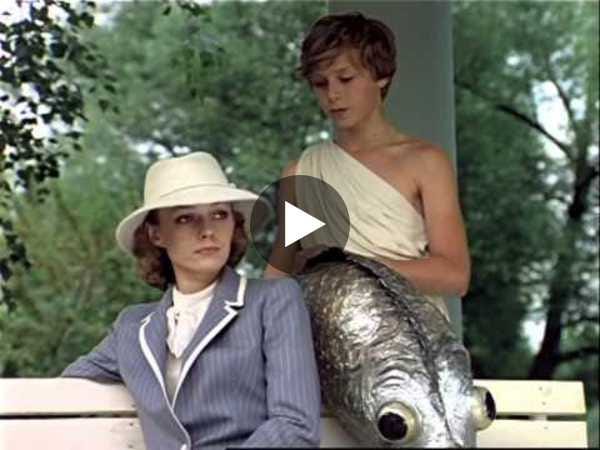Discovering Russia's Wonderfully Weird Mary Poppins!
Even though my next book is coming out in less than a month (!) this email is just about Mary Poppins, P.L. Travers, and the hard-to-find and wonderfully weird 1983 film Meri Poppins, do svidaniya.
More fun book stuff soon and happy new year!
I was never really into Mary Poppins until recently, when I worked my way through the documentary section of Disney+ and into Saving Mr. Banks (the 2013 film starring Tom Hanks and Emma Thompson about Walt Disney’s twenty-year attempt to get the film rights to Mary Poppins from her notoriously prickly* creator, P.L. Travers).
I can’t get enough of that kind of stuff, but a lot of reviewers criticized Saving Mr. Banks as “Disney propaganda” - which is fair enough. P.L. Travers was by all accounts a super-interesting and complicated person and it’s not wrong that “most people will come away from Saving Mr. Banks feeling like they just sat through a feature-length ad for the magic of Walt Disney, with P.L. Travers’ life tacked on as an afterthought” (this last quote’s from the Miami Herald… and there’s more where that came from if you scroll through Rotten Tomatoes).
Still, it got me hooked!
For a more in depth look at P.L. Travers’ relationship with Disney, I started with this 2005 essay in The New Yorker:
Becoming Mary Poppins | The New Yorker
P. L. Travers, Walt Disney, and the making of a myth.
This piece is packed with quotes like this and it’s definitely worth a read:
“[A]fter Disney’s years of fawning attention, Travers arrived in California expecting to be deferred to completely. Moreover, she was not as awed by Disney’s achievements as others were [….] Pamela Travers had discussed her poetry with William Butler Yeats and shared a masthead with T. S. Eliot. She thought that ‘Steamboat Willie’ was a fine entertainment for youngsters, but she considered most of the Disney oeuvre manipulative and false.”
P.L. Travers Audio - 1961 Mary Poppins Meetings at Disney
After I read up a little bit more about P.L. Travers and Disney, I decided to rewatch the original Mary Poppins from 1964 - and then the new Mary Poppins movie, Mary Poppins Returns (2018) - before getting into the books themselves… which present a totally different Mary Poppins from the Mary Poppins you meet in either of those two films:
“[A]s far as Travers was concerned, it was Walt Disney who got it wrong when he added spoonfuls of sugar to her really rather dark text […] As Travers’s text makes clear, Mary Poppins is no beauty. She has squinty eyes and big feet and regularly attracts the comment from the other characters that she is ‘not much to look at.’ Nor does the original Mary Poppins sound anything like the carefully modulated Julie Andrews. Travers gives her the accent and vocabulary of a real London nanny: cockney base notes overlaid with a strangled gentility.” (The Guardian)
And from that New Yorker profile: “She is, in fact, very often ‘angry,’ ‘threatening,’ ‘scornful,’ and ‘frightening.’ She calls the children cannibals, jostles them down the stairs, and makes them eat so quickly that they fear they will choke. She has a habit of saving the children from horrifying supernatural experiences, it’s true, but this would seem more of a boon if she herself hadn’t brought them on in revenge for naughtiness. Often, she seems like someone who doesn’t like children much.”
The Two Faces of Mary Poppins
Anyway, after all my research, the two big insights I brought into those viewings that I didn’t have as a kid were really pretty basic:
1) It’s the adults, not the children, who need Mary Poppins the most (at least, according to P.L. Travers - this went over my head completely as a kid but it really comes through when you’re watching as an adult).
2) In almost every story you’ll hear about Walter Elias Disney, someone recalls that he’d ask one of the Sherman brothers - who composed the original soundtrack - to play “Feed the Birds” on his office piano every Friday afternoon while he looked out over Disneyland, feeding the metaphorical birds… which is a pretty nice little window into good ol’ Walt.
But wait... there's more!
I got a lot out of revisiting the original Mary Poppins and highly recommend a rewatch if you haven’t seen it in a while, but the real surprise was finding a version of Mary Poppins that I hadn’t known about while I was looking up reviews for Mary Poppins Returns (which had its moments).
Translated in English as Mary Poppins, Goodbye, the actual title of a two-part Russian version of Mary Poppins from 1983 is Meri Poppins, do svidaniya (which I think probably translates better as the slightly less sinister Until Next Time, Mary Poppins).
A still from Mary Poppins, Goodbye (1983) featuring The Cat.
Either way, there’s not a lot of information out there about Mary Poppins, Goodbye… at least, not in English. The best I could find was this blog post:
“The production of Mary Poppins, Goodbye was commissioned by the USSR State Committee for Television and Radio Broadcasting (Государственный комитет СССР по телевидению и радиовещанию) in 1983 and was produced by the production company Mosfilm (мосфильм). In the early 1980s, Leonid Kvinikhidze was chosen to direct the production, as he was known for directing musicals. Screenwriter Vladimir Valutsky thus wrote a script based on P.L. Travers’ stories (it is unknown if they acquired the rights from Travers or not). Kvinikhidze never thought he was making a ‘children’s film,’ but rather for an adult audience, thus there is an ironic tone to the finished production.”
One of my favorite songs in Mary Poppins, Goodbye - "Lady Perfection"
The idea that Kvinikhidze thought he was making a film for adults is interesting given Travers’ early (adult-based) literary ambitions and her self-admitted focus on grown-ups in the Mary Poppins stories…
There’s definitely some common ground there!
But after watching her struggle for creative control in Saving Mr. Banks, it’s hard to imagine P.L. Travers signing off on this wonderfully weird, Casiotone soundtracked version of Mary Poppins (where Admiral Boom lives in a nuclear submarine, Mary Poppins is implied to be an alien, and Dick Van Dyke’s Bert is a protest song-writing Bob Dylan lookalike):
His songs are all actually pretty great.
From what I’ve seen in comment sections, this version is BELOVED by the kids who grew up with it… but the end result feels very much like the kind of off-kilter art house film you’d find in the Saturday Matinee section of the Criterion Channel - and in fact, the movie it most reminded me of was Chantal Akerman’s Golden Eighties (a super low-budget French pop musical set in a Belgian shopping mall that fits that bill exactly).
Not a recommendation, just an observation! :)
I can’t find anything to confirm if P.L. Travers ever saw this version of Poppins - she lived until 1996 and this movie premiered in 1984, so there’s always a chance… but I think it’s doubtful. Still, even knowing everything we know about how closely she guarded Mary Poppins when it came to Disney, I can’t shake the feeling that she might have actually liked it.
Or maybe just been amused by it, that feels like a safer bet.
Because as it turns out, P.L. Travers had kind of a long history with Russia!
The Russian Travels of Pamela Travers
A forgotten book by Pamela Travers has been published in Russia, Pushkin House is delighted to be welcoming its translator to give a talk about the discoveri…
The first book she published was a travelogue called Moscow Excursion (which she wrote in her 30s), and in a 1962 interview with The New Yorker she’s quoted as saying: “My great hope is to have [Mary Poppins] translated into Russian …. I know we don’t have any copyright agreement with Russia, but I say to my agent, ‘Never mind. Leave her around where the Russians can steal her.’”
And it feels like that might actually be the story of this film adaptation!
(I found that quote in an excerpt of a recent academic book called Translating England into Russian: The Politics of Children’s Literature in the Soviet Union and Modern Russian, which features an excellent chapter about P.L. Travers and Mary Poppins in Russia that you can read here.)
From governesses with supernatural powers to motor-car obsessed amphibians, the iconic images of English children’s literature helped shape…
If you’ve read this far, you might as well watch Meri Poppins, do svidaniya!
Of all of the Mary Poppins out there, I think this one might be my favorite (Saving Mr. Banks is worth a watch, too, for what it’s worth). You can check out Part 1 and 2 on YouTube (the subtitles default to Russian, though - for English subtitles, go to settings > subtitles > auto-translate > English):
Мэри Поппинс, до свидания. Серия 1 (музыкальный фильм, реж. Леонид Квинихидзе, 1983 г.)
Мэри Поппинс, до свидания. Серия 2 (музыкальный фильм, реж. Леонид Квинихидзе, 1983 г.)
If I haven’t said it recently, THANK YOU for being a subscriber to my newsletter - and double thanks for forwarding this on to your kid lit loving friends (and convincing ‘em all to pre-order Snow Struck!).
Your fan,
* Literally everything you read about P.L. Travers describes her as “prickly,” so a fun game to play if you’re reading a lot of stuff about her in one sitting is to count the pricklies.












